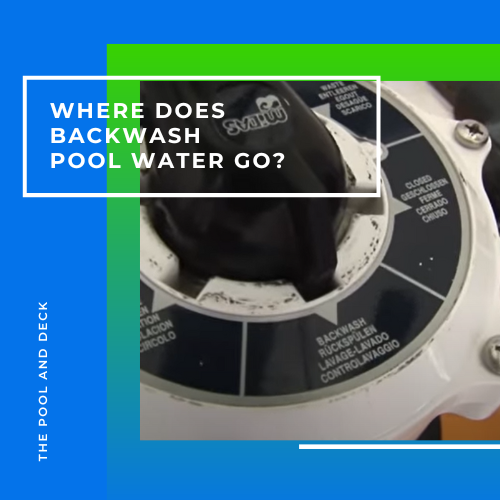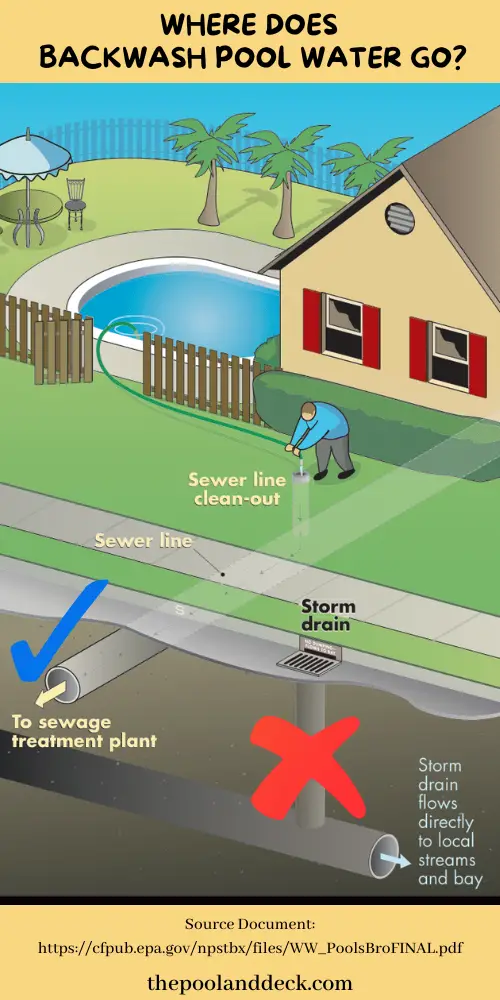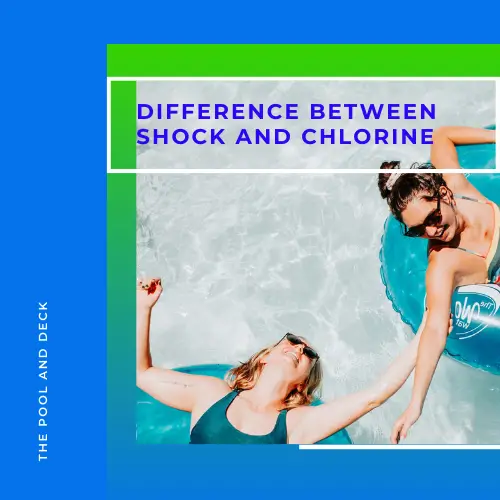Where Does Backwash Pool Water Go? Shocking Truth & Best Practice!
Table of Contents
Where Does Backwash Pool Water Go?
Stop! Before you connect the backwash hose have you considered where does backwash pool water go? Have you been draining your backwash pool water the wrong way, all this while?
You could, in theory, drain your backwash pool water to a:
- Stormwater Drain
- Backyard to water the grass or the vegetable garden
- Sewage System
- Septic Tank
- Water Treatment Unit
- Professional Water Disposal Service
You might ask, “What’s the big deal? It’s just a little bit of water, right?”
Wrong. Backwash pool water contains a variety of chemicals and contaminants that can seep into the soil and groundwater, polluting the environment and causing long-term damage.

So, the shocking truth is that only a a few of the above will be permitted by the local law and will be considered environmentally safe!
If you are doing it wrong, you may be in violation of the law or playing a role in harming the environment.
Swimming Pool Drainage Regulations
It is fair to ask what are swimming pool drainage regulations? The shocking truth is that there is no federal law that applies to the entire US. Even individual states do not have jurisdiction over where backwash pool water goes.
Only local jurisdictions, such as counties, have the jurisdiction to issue the rules and regulations. They can differ from county to county. The authorities determine the rules and regulations that best serve the local needs.
Having said that, they are generally guided by the U.S. Environmental Protection Agency (US EPA).
The EPA guidelines on “where does backwash pool water go” can be summarized as under:
- Never clean a filter or drain into a street, gutter or storm drain. Keep backwash discharges out of the street and storm drain
- Rinse cartridge filters onto a dirt area and spade filter residue into the soil
- Backwash sand and diatomaceous earth filters onto a dirt area
- Dispose of spent filter materials in the trash
- Discharge backwash pool water to a sanitary sewer cleanout or a septic system but only as per instructions of local wastewater treatment authorities

Source Document: https://cfpub.epa.gov/npstbx/files/WW_PoolsBroFINAL.pdf
What Is in Pool Backwash Water? How Does it Harm the Environment?
The pool backwash water contains necessary pool chemicals, albeit in small quantities, that are harmful to the environment. These are:, such as chlorine, salt, alkalinity and pH adjusters, cyanuric acid, and metals.
Chlorine
Chlorine is a strong oxidant and disinfectant that can harm aquatic life in nearby bodies of water. It can react with organic matter in the water to form disinfection byproducts that are carcinogenic and can cause health problems in humans and animals. Chlorine can also contribute to the formation of smog and air pollution.
Salt
Salt can affect the osmoregulation of aquatic organisms, making it difficult for them to maintain proper water balance, and can also inhibit the growth and survival of plants. Salt can contribute to soil salinization, which can affect plant growth and soil fertility.
Alkalinity and pH Adjusters
Alkalinity and pH adjusters can cause imbalances in the ecosystem, decreased biodiversity, and even fish kills. They can harm aquatic organisms, contribute to nutrient pollution, and cause imbalances in the ecosystem.
Cyanuric Acid
Cyanuric Acid can accumulate in bodies of water over time, leading to high concentrations that can harm aquatic life. It can also contribute to soil and groundwater contamination.
Metals
Metals, such as copper, iron, and manganese, can be toxic to aquatic life and can also contribute to nutrient pollution.
Can You Discharge Backwash Pool Water into Storm Drain?
Most certainly not.
The EPA is extremely clear on it and the local wastewater treatment authorities are sure to consider it as a legal violation. They have a very valid point too!
Storm drains are designed to collect and transport rainwater runoff from streets and other surfaces to nearby bodies of water. This water is NOT TREATED before it is discharged into natural water bodies.
Discharging of anything other than rainwater, including backwash pool water, into storm drains will cause irreparable harm to the environment, especially to aquatic life.
Can You Discharge Backwash Pool Water into Your Yard?
Discharging backwash pool water onto your yard is an option and is usually permitted by the local authorities. They may however have some stipulations about the size of the yard and its proximity to any natural body of water.
They basically would like to make sure that the discharged water remains within your lot. Please double check with them so that you do not get into any trouble later.
Even when it is legally permitted, there are potential downsides to consider:
- Growing Vegetables: The chemicals in the backwash pool water can accumulate in the soil over time. Plant growth may be adversely affected.
- Pet Health: The chemicals could endanger the health of your pets.
- Aesthetics: If you have a small lot, your backyard may become muddy or flooded.
You could take some precautions though:
- Test Before Discharge: Before discharging backwash pool water onto your yard, make sure to test the water to ensure that the chemical and metal levels are within safe limits.
- Dilute Before Discharge: Consider diluting the backwash pool water with fresh water to reduce the concentration of chemicals and metals before discharging it onto your yard.
- Spread the Discharge: Try spreading the discharge over a large area or to several spots. Avoid discharging onto areas with poor drainage and away from walkways, driveways, etc.
Can You Discharge Backwash Pool Water into Sewage Drains?
Yes. It is highly unlikely that the local wastewater treatment authorities will not permit this. In fact, this is the preferred way of dealing with backwash pool water and highly recommended by the EPA.
The reason is simple. Sewage drains lead to wastewater treatment plants. The wastewater undergoes various treatment processes before being discharged into the environment. This ensures that the water is no longer harmful to the ecosystem.
As a matter of fact, in many jurisdictions, it is mandatory to discharge backwash pool water into sewage drains to comply with environmental regulations.
As a pool owner, this is, of course, the most cost-effective option. There is simply no additional cost involved.
Can You Discharge Backwash Pool Water into a Septic Tank?
The answer is yes.
Possibly the only reason for having a septic tank on your lot is that you do not have access to the municipal sewage drainage system.
In such a scenario, not only is the septic tank a practical alternative but also one that is approved by the local wastewater treatment authorities.
Thank you very much for reading the post. I do hope you found it informative and helpful.






